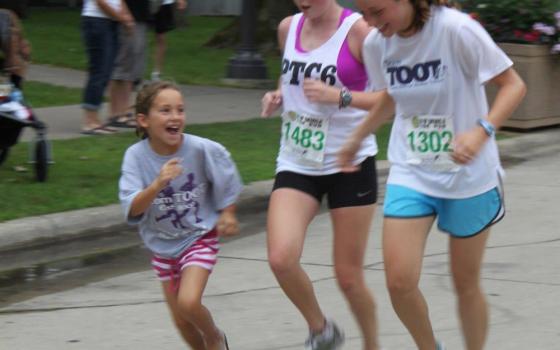January 1, 2016: It's New Year's resolution time, so we thought it would be a good moment to revisit this encouraging article.
______
I am very good at being flexible in my prayer life; I am not so good at being disciplined.
I find that almost anything can be a prayer, and I often encounter God in the relationships and activities of my daily life. But when it comes to scheduling some of those encounters ahead of time . . . well, let’s just say I have room for improvement.
A few weeks ago I learned the word askesis, Greek for “practice” or “training.” Before the Christian ascetics got hold of the idea (askesis is the root word of asceticism), the Greeks used it to refer to athletes’ physical training. I was captured by this idea, and when I discussed it with a mentor, she suggested that I choose another part of my life in which I’ve developed good discipline and transfer some of those skills to my prayer life. The answer was clear: running.
I took up running when I stopped playing competitive sports. Without the benefit of coaches, teammates, or pre-designed workouts, I had to be self-motivated and self-disciplined. Over the years, running has become an integral and thoroughly enjoyable part of my life. I’ve learned a lot from this particular way of exercising my physical muscles; I hope that the following lessons can also help me build my spiritual ones.
1. Consistency is key
Every advice column on running will tell you that if you’re short on time, it’s better to squeeze in a 20-minute run than to skip a day or two and try to make up for it later. Without consistency, you’ll never improve. Plus, consistency builds habit.
It’s much easier to hit the pavement if you’ve only missed a day than if you’ve missed three or four.
When it comes to prayer, I’m convinced that it is far better to “take five with God” than to wait for the perfect time, which may never come! Five minutes now is five minutes more than I might have later. Especially at the beginning, frequency in prayer is more important than intensity. I always remind myself that God only asks me to keep showing up.
2. Pace yourself and build endurance
I tend to be a little over-ambitious. When I first learned about centering prayer, I attempted it for a half hour. When I first started running, I thought a marathon would be in my near future. In both cases, I quickly learned that I would have to build up some endurance. I started with just a few miles of running and a few minutes of centering prayer. I had to learn to run more like a tortoise, so I wouldn’t burn myself out too quickly, and I had to learn to pray like one, too: patient and steady. I still haven’t run a marathon, and I still struggle to stay centered during our half hour of contemplation every morning at the novitiate. But I continue to build my endurance, and I’m learning to be more patient with myself.
3. Don’t forget to stretch
If I don’t stretch before and after a run, the next day I’ll probably be nursing my tight muscles and regretting the run altogether. It’s equally important to “stretch” our spiritual muscles. I have found that laughter, silliness and the occasional dance party are activities that help me loosen up, stretch my spiritual muscles and not take myself too seriously. When I loosen up, I’m more comfortable in my own skin and more honest with God.
There’s another kind of spiritual stretching, which happens when I’m invited to see the bigger picture. Activities I’d place in this category include: engaging in conversations that widen my world, learning to listen deeply, taking risks and daring to trust. These activities stretch the boundaries of my self-understanding; they pull me out of myself and into greater communion with the world around me.
4. Cross training is important
Alternating running with other types of exercise keeps a runner fit and less prone to injury, not to mention it staves off boredom! As much as I enjoy running, I’d go crazy without some variety, so I often bike, swim and hike as forms of cross training.
In the Dominican tradition we talk about “the four pillars” around which our lives are built: prayer, study, community and ministry. I like to think of prayer as the “primary spiritual activity” and the other elements as cross training. Study, community and ministry are incredibly important, but if prayer isn’t at the center, they lose their meaning. Without prayer, ministry may become empty activity, study may become selfish pursuit of knowledge and community may be just a group of people living under one roof. But when my relationship with God grounds and infuses all other activities of my life, then I can be spiritually fit and fruitful.
5. You gotta have form and freedom
Fans of the TV show “Friends” might remember “the one where Phoebe runs.” In this episode, Rachel is embarrassed to go jogging with Phoebe, who flails her arms wildly and freely. Rachel says Phoebe looks like a crazy person, and Phoebe accuses Rachel of being uptight. In the end, Rachel tries it Phoebe’s way and finds out that running is, in fact, much more fun with a little freedom.
Proper form is incredibly important for professional athletes, but for most of us, it’s more important to simply be aware of our bodies and to run in a way that feels comfortable and natural . . . even if it means looking a little silly. Have you ever watched runners cross the finish line at a race? Some of the fastest ones look the goofiest. Their form is balanced with a good dose of freedom.
I like to think of form as the structure or container for prayer (how and when I pray, whether I use Scripture, listen to music, journal or sit contemplatively) and freedom as what I do within that container. Too much form and my prayer becomes rigid and stifled; not enough form and I flail around getting nowhere; but just the right amount of form facilitates a free, rich and open relationship with God. And if the spirit moves me to get up and dance . . . then yes, I absolutely embrace looking silly.
6. It’s not a solitary activity
Although running might seem like a solitary sport, it’s not. Mostly I run on my own, and I appreciate the quiet and solitude. But some of my best runs have been those shared with others. There’s camaraderie in the matching of footsteps and the shared journey of a run. In races, I even feel that camaraderie with all the people against whom I’m supposedly competing. Runners support, encourage and strengthen one another – so do pray-ers! Even more than running, prayer is a communal activity. Prayer is inherently relational, so even solitary prayer is communal in nature. I’m grateful that both communal and personal prayer are regular parts of my life, and both enrich my ability to be in relationship.
7. It is SO worth it
When I start the morning with a run, my entire day is better. It’s not always easy to drag myself out of bed to run, but when I do I find that I have more energy and focus, I’m more positive, and I just feel better all day long. If I take time for prayer each morning, the same thing is true. I’m more patient, I have more clarity, and I’m more likely to act with compassion. Feeling good isn’t my motivation for prayer, but I won’t complain about it being a side benefit! Plus, just as running helps me stay healthy and physically fit, regularity in prayer helps me to “get thin” in a spiritual way: to be increasingly aware of the presence of God.
_____
I’m not an extraordinary runner, nor am I an extraordinary pray-er. But I do trust God’s grace will give me the patience, the persistence and the stamina that it will take to finish the race and keep the faith.
[Christin Tomy is a novice with the Dominican Sisters of Sinsinawa, Wisconsin. She has lived and worked in Central and South America and has a background in Spanish and social work. She is passionate about social justice, good hugs, Iowa and most outdoor activities. She also writes for her community’s blog at catherinescafe.blogspot.com.]


